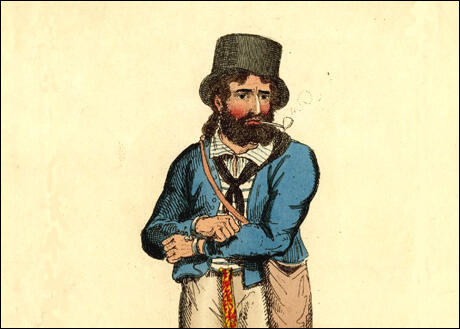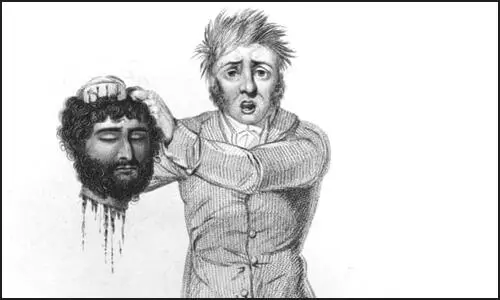Jeremiah Brandreth
Jeremiah Brandreth was born in Wilford, Nottingham in 1790. Brandreth became a stockinger by trade and later moved to Sutton-in-Ashfield where he lived with his wife and three children. It is believed that in 1811 he took part in Luddite activities.
In May 1817 Brandreth met William Oliver from London. Oliver claimed that a large group of Radicals were planning an armed uprising in London on 9th June and asked Brandreth to persuade local workers to join the rebellion. This was untrue and it is now believed that Oliver was working as an agent provocateur for Lord Sidmouth, the Home Secretary.
On 9th June, Jeremiah Brandreth led 300 men on a march on Nottingham. Armed with a few pistols and pikes, Brandreth expected others to join him on the way to the city. This did not happen and the authorities had little difficulty dispersing the proposed insurrection.

Jeremiah Brandreth (1817)
Thirty-five of the men were charged with high treason. Brandreth and two others were sentenced to death and another eleven men were transported for life. The men were originally sentenced to being hanged, drawn and quartered, but the quartering was remitted.
On the scaffold one of the men shouted out that they were victims of Lord Sidmouth and Oliver the Spy. Percy Bysshe Shelley campaigned against the use of agent provocateurs in The Examiner. Edward Baines of the Leeds Mercury investigated their claims and was able to find enough evidence to implicate the government in the conspiracy. In his article exposing William Oliver, Baines described him as a "prototype of Lucifer, whose distinguishing characteristic is, first to tempt and then to destroy."

Primary Sources
(1) A government spy reported on Jeremiah Brandreth on 1st June, 1817.
I went to Jerry Brandreth's between six and seven this evening. We left his house and met Stevens and walked up Sandy Lane. Stevens said I should have been here on Monday night. He stated that there was a London Delegate, who reported that there was about 70,000 in London ready to act with us; and that they were very ripe in Birmingham.
(2) William Stevens, a radical reformer from Nottingham, gave his account of William Oliver's visit in William Cobbett's Political Register (16th May, 1818)
On the 1st or 2nd of June, Oliver came to Nottingham. He said, that all would be ready in London for the 9th June. Oliver had a meeting with us now, at which meeting Brandreth and Turner, and many others were present. At this meeting he laid before us a paper which he called a plan of campaign. When Oliver had thus settled everything with us, he prepared to set off to organize things in Yorkshire, that all might be ready to move in the country at the moment that the rising took place in London, where he told us there were 50,000 men with arms prepared, and that they would take the Tower of London.
(3) William Cobbett, Political Register ((16th May, 1818)
Oliver drew towards London, leaving his victims successfully in the traps that he had prepared for them. The employers of Oliver might, in an hour, have put a total stop to those preparations, and have blown them to air. They wished, not to prevent, but to produce those acts.
(4) Percy Bysshe Shelley, The Examiner (9th November, 1817)
On the 7th November, Brandreth, Turner and Ludlam ascended the scaffold. We feel for Brandreth the less, because it seems he killed a man. But recollect who instigated him to the proceedings which led to murder. On the word of a dying man, Brandreth tells us, that "Oliver brought him to this" - that, "but for Oliver, he would not have been there." See, too, Ludlam and Turner, with their sons and brothers, and sisters, how they kneel together in this dreadful agony of prayer. With that dreadful penalty before their eyes - with that tremendous sanction for the truth of all he spoke, Turner exclaimed loudly and distinctly, while the executioner was putting the rope round his neck, "This is all Oliver and the government." What more he might have said we know not, because the chaplain prevented any further observations. Troops of horse, with keen and glittering swords, hemmed in the multitudes collected to witness this abominable exhibition. "When the stroke of the axe was heard, there was a burst of horror from the crowd. The instant the head was exhibited, there was a tremendous shriek set up, and the multitude ran violently in all directions, as if under the impulse of sudden frenzy. Those who resumed their stations, groaned and hooted."

